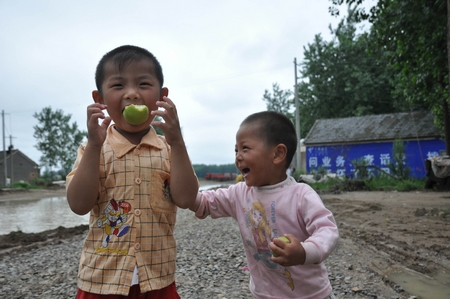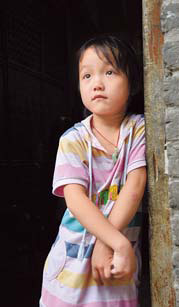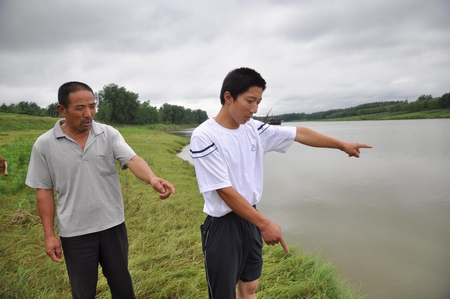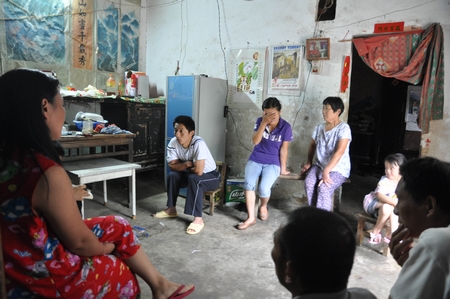Focus
Home alone in the countryside
By Zhang Yue (China Daily)
Updated: 2010-08-13 12:12
 |
Large Medium Small |
The children of migrant workers are struggling to cope in rural areas without parental care. Zhang Yue reports from Anhui.

Two boys have fun in the village of Chenjia near Fuyang, Anhui province. Most children in the village live with their grandparents while their parents work away in big cities to earn extra money. Provided for China Daily |
Children of migrant workers left in villages nationwide are at serious risk of physical and psychological dangers, mental health professionals have warned following the tragic deaths of five children.
About 58 million left-behind children live in the Chinese countryside, according to a survey by the All-China Women's Federation in 2008.
The number is almost three times of what was recorded in the government's 2000 census.
The rise has been attributed to the vast number of parents who have flocked to cities in search of better salaries, leaving their offspring in the care of older relatives.
Yet, as their numbers have increased, so too has concern over poor educational standards and their general safety, particularly during the summer months.
The latest event to highlight the problems occurred in Anhui province in June when five children were killed while playing in the Shahe River, a 200-meter-long branch of Huaihe River.
Chen Yanhuai, 15, his two cousins, 12-year-old Chen Jian and Yue Cuiwei, had just finished their final exam on June 29 and went for a swim near their homes in Chenjia, a village of about 800 households in the city of Fuyang.
However, they quickly got into trouble, prompting two friends, Chen Yanzhen and Chen Huanhuan, to dive in to help. All of them drowned.
"They were playing on the riverside at first but then decided to swim into the middle of the river where there is a steep slope," said a 10-year-old boy who witnessed the accident.
The parents of the four boys are all migrant workers who were away at the time of the accident.
"Almost all of the parents of children in the village work in large cities to get better incomes," said villager Chen Weigao, 63. "Most of the kids are taken care of by their grandparents."
For 13 years, Chen Weizhou, 57, and his 53-year-old wife have been the only ones taking care of Chen Yanhuai, Chen Jian and Yue Cuiwei.
"For me, that day was the end of the world," said the devastated grandfather, who when interviewed by China Daily reporters simply kept repeating: "I feel so sorry for my sons and daughters. I was supposed to take good care of their children but I did a bad job."
At least 17 youngsters drowned in rivers, lakes and streams across Anhui between June and July, according to figures released by the Anhui education bureau. Most victims were left-behind children in rural areas.
"Sometimes we try to catch spiral shells near the river in summer," said a 10-year-old boy who lives beside Shahe River, "but no one has come near here to play since the accident."
Li Yu, 34, the mother of Chen Yanhuai, who also has a daughter, has run a grocery store with her husband in Foshan, Guangdong province, for more than a decade. She said her son had been expected to spend the summer in the city with them.
The couple, who rushed home after hearing of the accident, had considered taking their son to Foshan many times but was put off by the expensive school tuition fees, she said.
"For a non-permanent resident in Guangdong, it would have cost about 20,000 yuan ($3,000) to enroll him in a primary school," said Li, who explained that the sum was the equivalent of her family's entire annual income. "It was almost impossible for us to afford but my husband and I were working hard to raise the money."
The parents of Chen Jian said they had experienced the same problem.
"I felt my heart breaking to pieces every time I left home after Spring Festival (the Chinese Lunar New Year and a traditional time for migrant workers to return home)," said Xie Zhenyue, the boy's mother, who has sold fruit with her husband in Beijing for six years.
"I knew he wanted to stay with me but it was so hard for us to get him educated in Beijing," she added while crying.

Six-year-old Chen Ting from Yingshang county, Anhui province. Both of her parents are migrant workers in Foshan, Guangdong province. Provided to China Daily |
As well as grieving for her lost son, Li now must decide how to improve the life of her daughter, Chen Ting, and prevent her from being involved in a similar tragedy.
Although she will start primary school this September, the 6-year-old speaks the local Anhui dialect and barely understands a word of Mandarin, largely because the only people she communicates with are her grandparents. She is shy and withdrawn and responds to most questions with a simple shake or nod of the head.
Like her brothers, she will go through childhood with very little contact with her parents.
Language of learning
A 2008 study on the living conditions of left-behind children by the All-China Women's Federation found that 34 percent of rural guardians - read elderly relatives - said they only have enough time to "keep an occasional eye on them".
About 8 percent felt they did not have enough time to ensure their charge's safety.
"These children make up a large proportion of the country's young generation," said Liu Zhengkui, an associate research fellow with Chinese Academy of Social Sciences. "If the mental health of left-behind children is ignored, over time they may grow up to be indifferent and irresponsible members of society."
Huo Shunyan, 60, looks after his 18-month-old grandson in Chenjia village, yet the boy still cannot speak a recognizable word in either Mandarin or Anhui dialect.
"We do not see anything wrong with that," said Huo. "Most children here grow up with their grandparents and we just don't have much time to talk with them. We need to work in the field and prepare three meals a day."
Research by Liu Xia, a doctor with Beijing Normal University's development psychology center, showed that left-behind children generally suffer a lower sense of dignity and life satisfaction than children who live with their parents.
Government activities are regularly organized to help youngsters cope with the mental strain.
On July 29, the Hunan provincial government paid for 19 children from Shaoyang county to travel to Dongguan, an industrial city in Guangdong, to spend the summer with their migrant worker parents.
Yet, experts say that, ultimately, parental care is essential to a child's sound development.
"Living in their hometowns with grandparents is not good for a child's future development," Wang Yongzhen at Zhejiang Normal University told the People's Daily in a recent interview. "It is much better for the kids to grow up with their parents working in big cities."

Villagers point out where the five children drowned in Shahe River, a branch of Huaihe River in Anhui province. Witnesses say three of those killed had tried to swim into the middle of the river. Provided for China Daily |

Relatives of Chen Yanhuai and his cousins are still deep in grief following the deaths in June. Chen's parents work in Guangdong province but rushed home after hearing about the accident. Provided for China Daily |